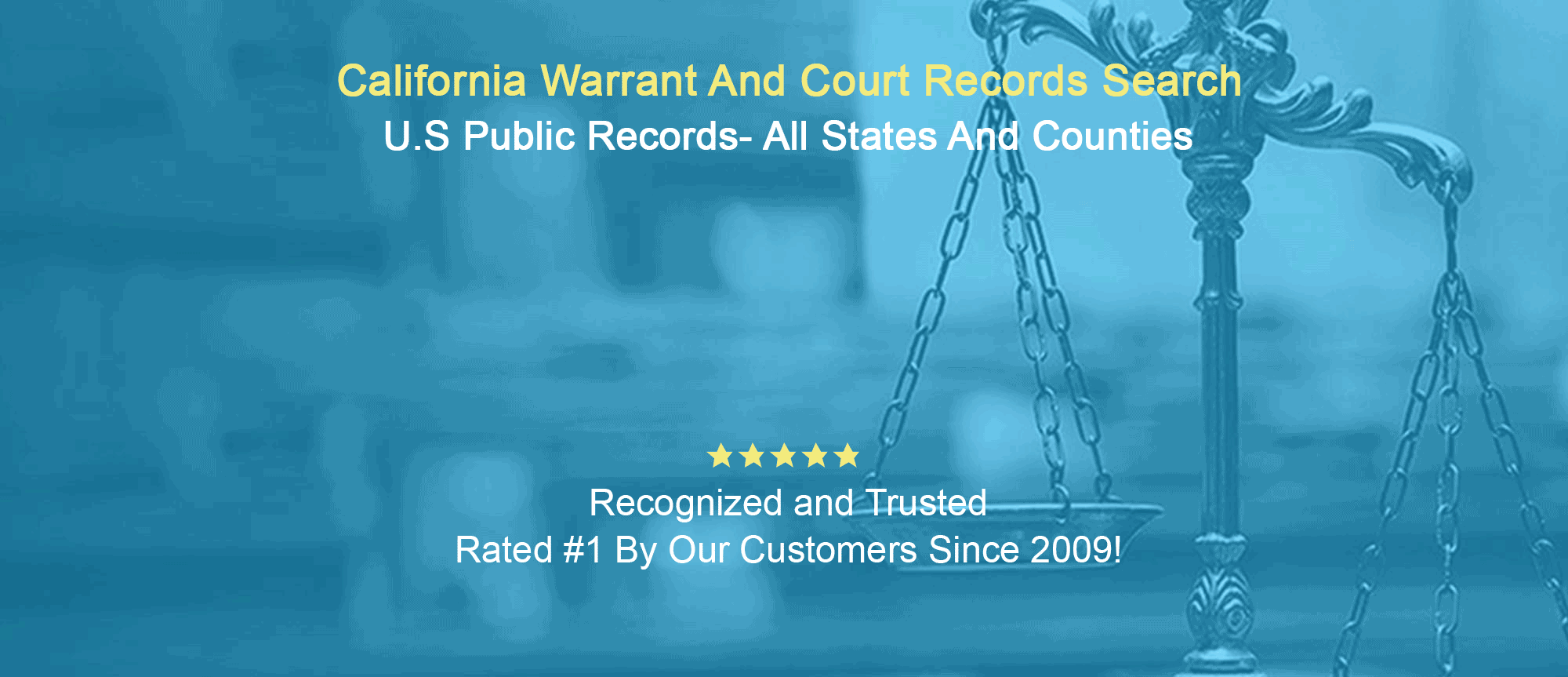
Criminal Records and Active Warrants
Search felonies, misdemeanors, drug arrests, failure to appear, unpaid traffic violations, DUI's, child support warrants, and much more.

People Search
Search for family members, friends, acquaintances, dates, and more. Get information on anyone's background. Access to over 1 billion records.
Public Records
POur database includes property records, current/previous addresses, phone numbers, marriage/divorce records and more. All searches are completely confidential.
The Facts About California Warrants
An arrest warrant in California authorizes local law enforcement to take an individual into custody who has been suspected of committing a crime. All warrants must be sanctioned by a judge in order to be legally carried out. Citizens in California who have broken the law may find themselves with an arrest warrant in their name. In California, a warrant may be issued if you fail to appear at a court hearing, fail to comply with a court order, or are suspected of being involved in criminal activity. If you do not show up for a court case, this could result in a mandatory court appearance, additional charges being filed against you, or a hold being placed on your driver's license.
For law officer's to legally obtain an arrest warrant, they need to present evidence in front of a judge. This evidence must be based on tangible facts, not heresay. A judge will not consider issuing an arrest warrant without credible evidence that demonstrates probable case. Probable cause means there is enough reasonable evidence against the person named that he/she most likely committed the crime that is being investigated. After looking at the facts, if a judge agrees there is probable cause, then an arrest warrant will be issued. When this happens you risk being arrested since an arrest warrant is attached to your name.
Not all warrants are created equal. There are different types of warrants in the U.S. court system each with a specific function. It's important to note that most warrants pertaining to the law do not expire. Warrants can stay on your personal background record indefinitely unless your case is resolved with a not guilty verdict or you're able to expunge the record successfully with the help of a criminal lawyer. Search warrants are an exception to the rule. A search warrant must be executed upon within a specific time frame since it allows for the search of a person, location, or vehicle for evidence of a crime.
Searching Warrants in California
There are many valuable resources for searching arrest warrants, criminal records, background records and vital records in the state of California. All of these records are classified as public records which any citizen has a right to access. Criminal records are maintained by the California Department of Justice. The California Department of Justice (DOJ) was given the right to provide public records under California's Public Records Act. In 1968, the Public Record's Act was enacted to safeguard the accountability of government to the public which includes making public records available to those who want them.
This link offers more information about the California Department of Justice guidelines to obtain public records. Please note, if you're requesting records for someone else other than yourself, the DOJ will not authorize or process those requests.
It's a good idea to review your criminal history report for accuracy from time to time. In order to get a copy of your California criminal report, you are required to submit fingerprint images. This is to confirm your identity and to ensure the correct records are sent to you. It will cost $25 to get a copy of your criminal report made payable to the Department of Justice. Instructions for requesting your criminal history can be found here.
Inmate Records The California Department of Corrections and Rehabilitation offers an online search tool to locate adult inmates currently incarcerated in a California Corrections and Rehabilitation facility. The service is free to use and is intended to promote public safety while providing access to offender information. You will need to know either the inmate's number or the person's last name to conduct a search. You can call the CDCR's Identification Unit at 916-445-6713 if you need help finding an inmate. There is also a list of Corrections and Rehabilitation Institutions in case you need to find an institution or want to visit in person.
If You Have Been Convicted
Appeal Process
The California appeals process allows defendants who have been unfairly convicted the chance to correct their injustice. This system is designed to cure legal errors that were made at the trial level with the intent to reverse conviction. Legal counsel with a qualified attorney can help you file an appeal. The side that files the appeal is called the "appellant." The other side is called the "respondent." If you appeal, the appellate court will review the case to decide if a legal mistake was made and needs to be corrected. There are a few types of errors that are grounds for appeal.
Prejudicial error:
Prejudicial error includes mistakes made by the judge regarding the law, incorrect instructions given to the jury and misconduct by the lawyers or the jury itself. The mistakes must have harmed the appellant or changed the outcome of the trial to be reserved.
No substantial evidence:
There is no substantial evidence that reasonably supported the trial courts decision.
Remember, an appeal is not a new trial. The appellate court will not consider new evidence. You also can't appeal a court's decision just because you don't like the outcome. There must be a mistake or error in the law that impacts the outcome. The court system takes appeals very seriously and may punish people who file invalid lawsuits. Consult a lawyer to help guide you through the appeal process and to make sure you legally have a case for an appeal.
Your Rights to Fair Bail
Bail refers to the money you or someone you know posts with the court in order for you to be released from jail. It's a way of ensuring the court that you will attend your future court appearances. If you don't have the money to post cash bail, bail bonds can be used. Bail bonds allow you to pay a percentage of the bail with a bail bonding agency putting up the rest. The process of obtaining the bond is relatively easy and once posted you will be released from custody. Bail agents take a percentage of profit, typically no more than 10% as decided by California law.
If you fail to appear for court (commonly referred to as an FTA), the judge forfeits your bail money and may issue a California bench warrant for your arrest. If you paid cash bail none of your money will be returned to you. Bail regulations depend on the crime and vary by the county the offense was committed in. The bail amount can vary depending on the crime involved. All California counties have their own bail schedules. Bail can range from $500 to millions. It is the judge who ultimately sets your bail.
Court Records
Court records in California are documented with the court system by the county recorder or recorder of deeds and filed with the state. California’s court system is the largest in the United States with over 500 courts including 58 county superior and trial courts. Each county in California has their own county clerk who is responsible for keeping records for their county. One way to locate court records is to go to the county court where the record was created or the offense took place and visit the records department for assistance. If you need to locate a court to pay a fine, to appear for a hearing or other court related information you can go to this link. There you can search for a court by city or zip code.
Public Records
To request records online you want to contact the Public Records Coordinator at the DOJ. If you need a hard copy of a record you can access the public records request form here. Although they do encourage people to use the electronic form online for a faster response. You can mail your request to the Attorney Generals Office, Public Records Coordinator, P.O. Box 944255, Sacramento, CA 94244-2550.
Vital Records
Vital records in California are maintained by the California Department of Public Health Vital Records (CDPH-VR). There is a fee to obtain copies of any vital record which vary depending on the type of record you're requesting. The California Department of Public Health's Vital Records Department (CDPH-VR) does not accommodate online requests so you will have to accomplish any request in person. For more information you can call them at 916-445-2684.
Traffic Violations
The state of California provides information on how to pay a traffic violation on the states court website. You will find much instruction on what to do if you have a traffic violation, how to pay it, when to appear in court and how to contest a violation. Traffic tickets are handled at the county office in which the ticket was issued. You can access court locations by county to find the court you need. You can pay any traffic violation in person at the court it was issued or by mail to the address listed on your ticket. Some county courts in California allow you to pay your ticket online. You can visit the Payment of Fines page for further directions. The CA Judicial Branch site offers an FAQ to assist you in regards to paying traffic tickets, contesting a ticket or for any other issue related to traffic violations.
Why Customers Choose CaliforniaWarrant.org

Access Billions of Records

Your Constitutional Right
Search Assistance
If you are having trouble finding the records you need from our site, we have search specialists here to assist you. We offer search assistance to all our customers at no cost to you. Our search team will help you locate any records in all 50 U.S. states for any person.
In order for our search specialist to pull the correct records, the following information is necessary to run an accurate background search; first name, last name, date of birth, state, and address (If you have) of the person you need records for. A search specialist will run a detailed search based on the criteria you provide and send you the results within 24 hours. That is our 100% service satisfaction guarantee.




